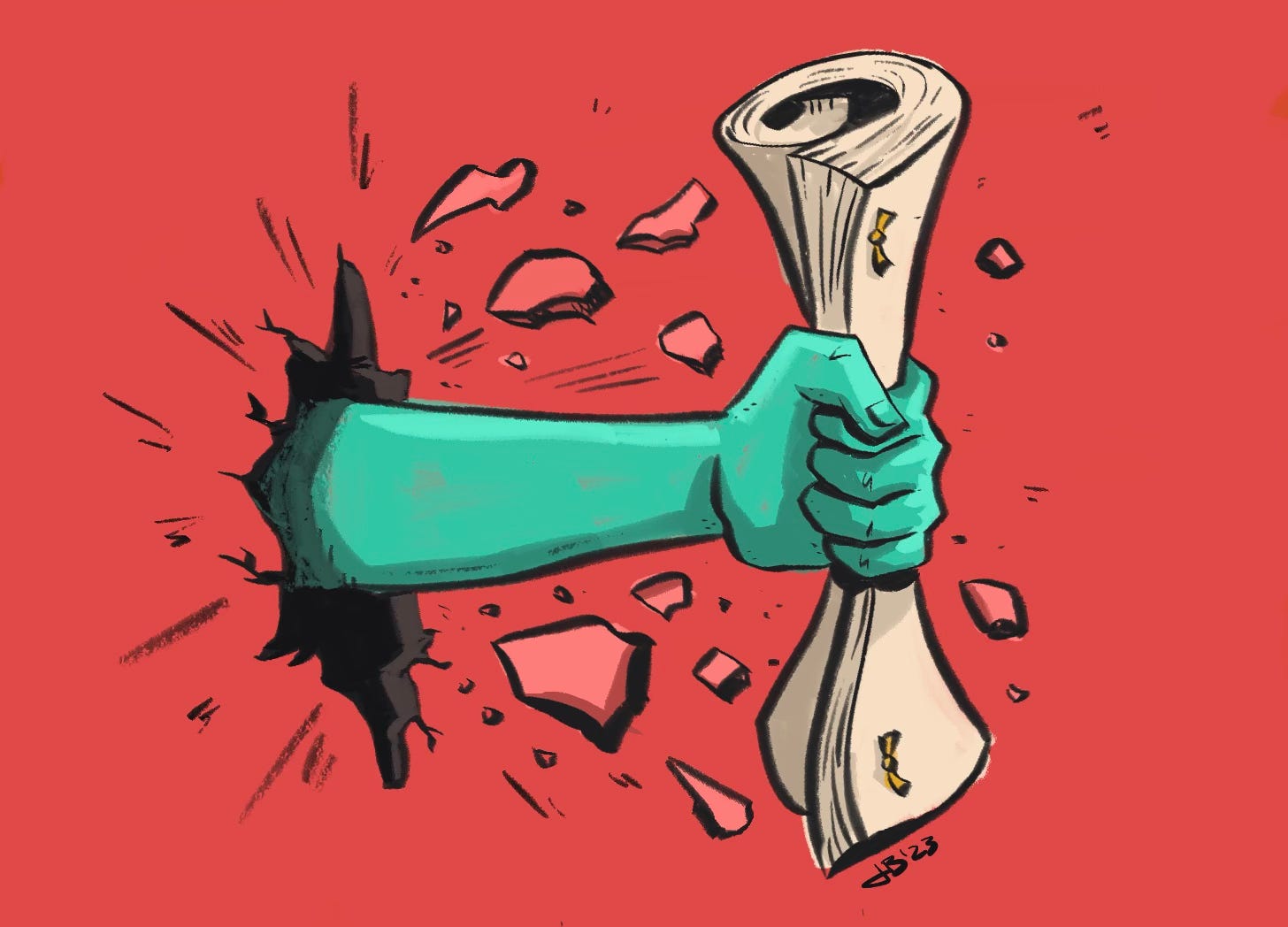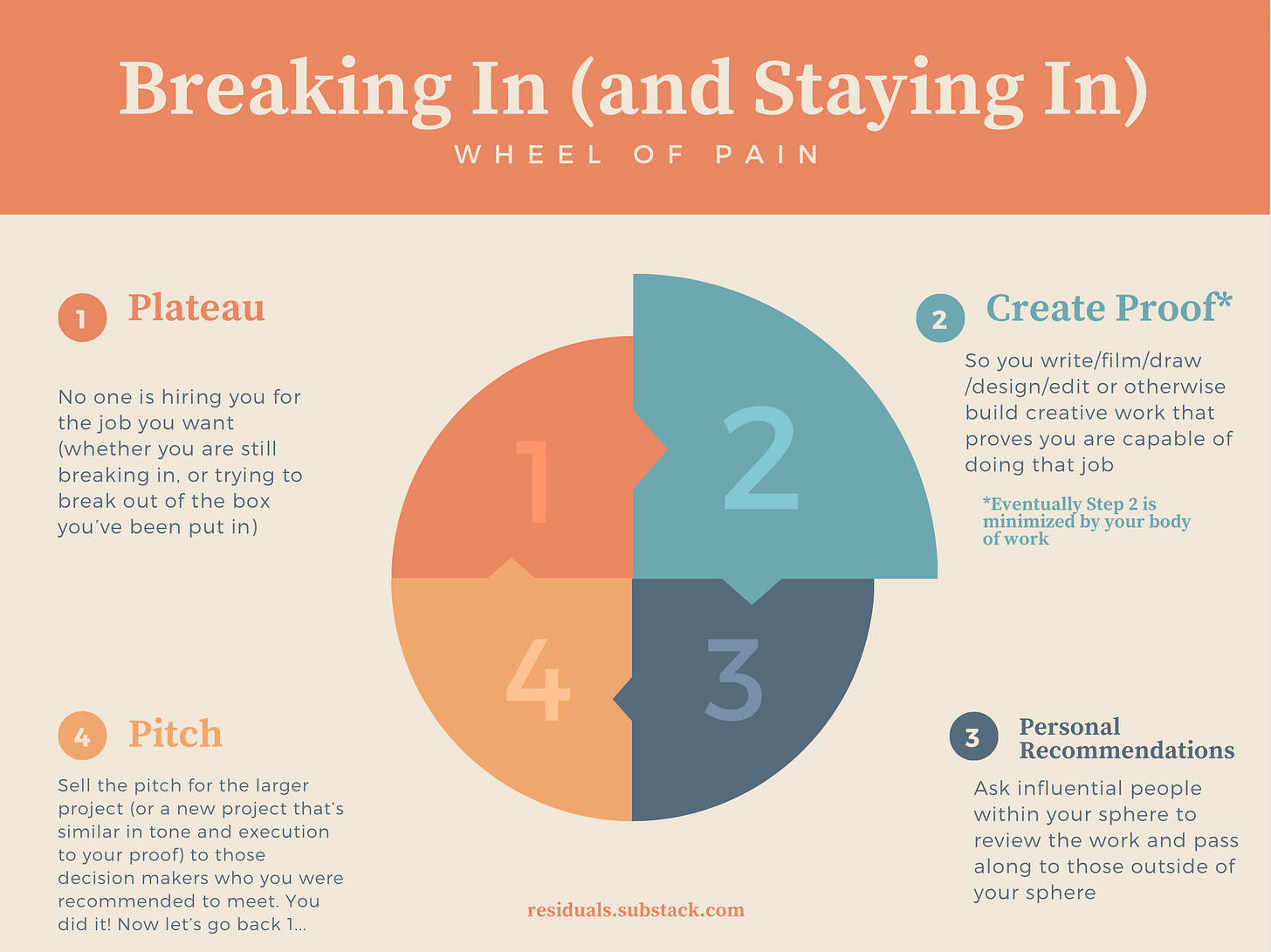Breaking In (and Staying In) #2 - Different Forms of Proof
...and Why They are All "Finishing Your Script"

A few years ago my writing partner and I pitched on a couple of feature OWAs that were set up with producers. They were relatively small, mid-budget projects. Seemingly low risk.
We had great takes on the material and were passionate about the stories, and we busted our asses to break the story and build engaging pitches to walk everyone through our plan.
At that point, we’d established ourselves in the TV writing space after working on a couple of animated series, but these movies were live-action. Bigger projects with action and comedy and set pieces and complicated relationships at the center of them.
“Who cares, we are professional writers and we’ll win them over with our great pitch!” Or so we thought.
After each one (and months of free work), the same feedback crushed our dreams: “We love their take, but they don’t have a feature sample so we went with someone else.”
That was it. We had “broken in”, proven ourselves as writers, the producers loved our TV writing and our pitch… but they couldn’t take the risk that we had no idea how to write a movie since we’d only proven we could do TV.
The thing is, we’ll never know if that’s actually true or just an excuse to pass because they didn’t like our take. Maybe our pitch was terrible and they didn’t want to insult us, so they blamed it on us not having the right sample.
I don’t know about you, but I’d much rather someone tell me they don’t like my idea, so we decided to make sure that could never be an excuse for coming in second again.
We picked one of the ideas we’d been kicking around, gave ourselves a deadline, and started writing. An action comedy feature with big set pieces and high-tech weapons and a father/son story at the center of it.
And you know what happened to that script? A producer tried to buy the first draft, it became a sample, and it opened the door to writing an action comedy with big set pieces and low-tech weapons and a brother/sister story at the center of it, which we sold to the first place that read it.
We no longer had to say “trust us, we can do it!” we had the proof.
Today, we’re talking about Creating Proof for the next step of your career.
Last week, we talked about why the entertainment industry is built on proof, but before you can sell a $200 million action comedy pitch, you need proof that you can write an action comedy script. The only way to prove that… is to have already done it.
It’s true of $200 million projects, but it’s also true of $50,000 projects. Productions require investments of money and time, and no matter how large or small, no one wants to invest in a project that doesn’t make it to the finish line.
Their job is to pick the right people who can get a project made the right way, and our job is to show them why that’s us. You need more than a great idea to do that, you need proof that you can pull it off.
Proof of Execution VS Proof of Concept
It’s easy to get caught up in building the wrong type of proof.
We’ve all been there. Negotiating with ourselves for ways to make all of this easier, we convince ourselves that “It will take less time if I write it as a short story, or a comic book, or a novel, or make a short film that can be the proof of concept. Then I’ll sell that and write the movie.”
In the IP craze, it might even seem like the smarter move. But unless you already have an incredible sample script or a body of produced work in the same tone/genre/format as what you want this idea to be, the best-case scenario may be that you sell the idea, but not yourself as the writer who can turn it into a feature or series. For that, they’ll go to someone who has proof that they can write this kind of project already.
This is the Proof of Concept - putting in the work to establish a concept in any form other than a script in the hopes of selling and adapting it into a film or TV series.
The flaw is thinking that the idea itself is what is valuable rather than your ability to execute the idea.
Chances are the buyers aren’t hesitant to pay you to write this project because they don’t believe the concept will work, they don’t know if you can pull off the execution of the concept. We tell ourselves that one great idea can launch a career, but it’s never about the idea - everyone has a great idea now and then - it’s about whether or not you can do the actual work of developing, writing, rewriting, taking notes, working with directors and actors and producers, cutting pages and combining scenes for budget, etc, etc.
And on top of that, it will never be easier or take less time to launch an idea as an unproven writer (at least in that genre/format) in any form other than writing a script, because each one of those formats has an entire industry built around it, with gatekeepers and landmines just waiting for newbies to step on.
If you’re an established writer with a body of work, then sure this can be an option to establish IP that you now own and have a bit more control of, but if you’re not…
…focus on a Proof of Execution.
The single best kind of proof that you should be hired to write a script (or paid to write the script you’re pitching), is a finished script that shares traits with the kind you’d like to be hired to write. That’s it. Nothing else beats this and it’s the one prerequisite to be a writer in this industry: you have to have already written.
If you want to be hired to write a horror film, you should have a horror feature script. If you want to be hired to write an hourlong procedural, you should have an original hourlong procedural pilot. Your hourlong procedural pilot won’t get you a job writing a horror movie, and vice versa.
It sounds so obvious, but we all know people (ourselves) who haven’t put in the work to write the sample and still agonize over how no one is calling them to do the job they know they can do. If you know you can do it, do it. Then everyone else will know, too.
Proof of Execution (sample script) is the only place to start. Then you can look at other ways to help move the needle.
Other Forms of Proof (In Descending Value):
I put this together for my pitch development class, and I think it’s a good quick guide to the value ladder of the proof you have to show for yourself when it comes to pitching to work on or getting funding for a new project.
Produced project in the same tone/genre/category as your pitch (produced comedy feature for comedy pitch). It’s already been made, so not only did many many people read and green light and attach to the script, but it also survived production and now exists in the world.
Produced project in a different tone/genre/category, but shares other similarities (produced comedy feature for comedy series pitch). Okay, it’s not a direct one-to-one, but you’ve still made it all the way through production, and tonally there is a clear overlap.
Sample Script in the same tone/genre/category as your pitch (great comedy feature script for comedy feature pitch). This is the gold standard because it’s the highest on the list without needing millions of dollars of investments. You can put this together alone in a room on a laptop, and it’s proof that you can do this job.
Sample Script in a different tone/genre/category, but shares other similarities (great comedy feature script for comedy series pitch). This proves you know how to write something similar. It may not prove that you can write *THIS*. That’s the risk, but hey it may work!
Sample Script in a completely different tone/genre/category with no crossover, but serves as proof on its own that you know how to deliver a screenplay (comedy feature script for drama series pitch). This proves you know how to write *something*. Hey, that’s better than nothing and honestly better than most people!
Produced project in a different medium that serves as proof of concept for THIS idea
Comic Book, Novel, Short Film, Short Story, Webcomic, Web-series, Sketch, Social Media project with lots of engagement (the concept established in this is what you will expand out for your pitch). It isn’t proof that you can write the eventual feature or TV script, but it establishes a proof of concept and that you can author a version of it.
Produced project in a different medium that’s a different project from what you’re pitching, but shares similarities with your project
(comedy horror short film for a different concept horror feature pitch) This… is not super valuable. We’re getting further and further away from the proof that’s needed.
Produced project in a different medium, different project, no similarities
(published horror comedy comic book used for a drama series pitch) Well hey, good for you for getting a comic published. Maybe if there’s a huge fanbase you can use that to say there’s an audience who wants to see your next work, no matter what that is.
What won’t work as Proof?
Unproduced sample script for a different medium, different project, no similarities to what you’re pitching
(unpublished horror comedy comic book script for drama series pitch)
Waiting for a high-powered producer to rush up to you in a panic for ideas to present to the head of the studio. They’ve never met you, but you just happened to be in the right place at the right time, and with the right idea - “two words: Vape. Olympics.” Sit down. Receive check. Await new life.
Tweets saying “GIVE ME A MARVEL MOVIE YOU COWARDS!”
With those in mind, I think it’s clear that the simplest option that all of us have when we’re feeling stuck on the outside of this business, or are hitting the career plateau, is to just write the script.
It’s the simplest thing, but that doesn’t make it easy. That’s why we convince ourselves that we should learn to draw, build our own webcomic, learn the finer points of online marketing, build a massive following, and then use that to leverage the idea into… a script that we could have written from the start.
Next week:
Let’s talk about some other things you can control in the world of Proof: a calling card as a way to bring eyes and attention to your samples.
Have some thoughts to add? Join the Discord
Thanks for reading! As good as it is in your mailbox, I think the Substack app is the best way to read and catch up on the archive of previous posts. Check out my page on the app/website.
And big thanks to Josh Blake for making an illustration for this series! You can see his work at Gallery 1988 and on his website www.joshsethblake.com




